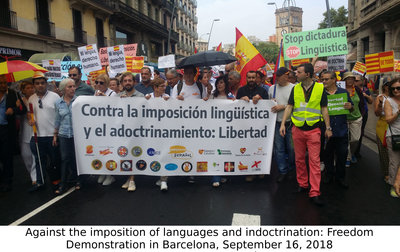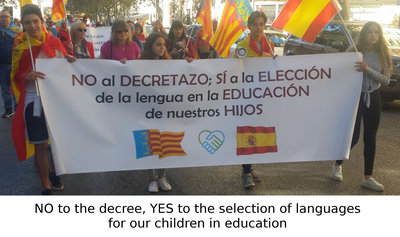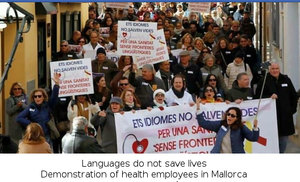| | | | And at continuation of this series about languages imposition and democracy Click here to subscribe or cancel your subscription |
In the autonomous regions of Spain there is language dispute and language imposition. You want to have some facts about languages? This series provides information and consists of 6 parts:
1. South Africa: Bloody insurrection against language imposition click, to read part 1
2. Catalonia: language imposition and the division of a nation
3. Language imposition, falsification of history and indoctrination click, to read part 3
4. Language impositions in the Ukraine click, to read part 4
5. Ways out of language conflicts - What is Language? click, to read part 5
6. Language protection - does this work in France? click, to read part 6
Language imposition and democracy
Part 2 Catalonia: language imposition and the division of a nation
Language ban, language imposition and language dictatorship are various instruments from the toolbox of undemocratic rulers and governments. Spain is a state of several nations in which these instruments are still used today.
Spanish und Catalan[1]
The Franco dictatorship and the language imposition
Contrary to many claims by Catalan separatists, there has never been a Catalan war against Franco.[2] The Spanish civil war in Catalonia was, just as in all Spanish regions, a fight of the fascists against the Republicans, right against left, top against bottom, rebels against the state.Spanish: part of Catalan culture for centuries
The Catalan bourgeoisie, which succeeded in developing an industry in the 19th century, found a closed market for its products in Spain under the conditions of its time, a market which they could partly dominate oligopolistically. The Catalan bourgeoisie had good reason to organise huge patriotic demonstrations in Barcelona to support the Spanish war efforts against the insurgents in Cuba. But when in 1898 Spain lost the war for the colonies in Cuba and the Philippines to the Americans, something like a Catalan idea of independence slowly began to develop, which in the Spanish Civil War 1936-1939 against Franco often turned out to be just as harmful as the fight of the communists and anarchists among themselves in the republican camp.
After his victory, Franco did not touch the private ownership of production in Catalonia and so there was soon no longer any important reason for the Catalan bourgeoisie to demand further independence for Catalonia. Even existing Catalan monopolies in Spain were not touched and already in 1943 Franco stated by decree, even to the detriment of Madrid, that international fairs may only be held in Barcelona and Valencia.
In this situation Franco's Spain and certain parts of the Catalan bourgeoisie came again to a companianship. Franco, who had banned the use of all regional languages immediately after the victory in the Civil War, lifted these bans. Already in 1961 the Franco regime allowed the foundation of Òmnium Cultural. Òmnium Cultural was an organization dedicated to promoting the Catalan language and culture when it was founded. Catalan theatrical performances and literature began to normalize the cultural and linguistic everyday life, while at the same time the Spanish language became the absolute dominant language. Official documents and contracts were only recognized if they were written in Spanish, which was the only official language and language of instruction in schools. Considering that the mother tongue of a large Catalan minority was Catalan, this state of affairs can be described as a language dictatorship.
The hatred felt by many Catalans for the Spanish language, who could not share in the wealth, becomes understandable.
„In 1469 Queen Isabella of Castile and King Ferdinand of Aragón married, and although both crowns kept their institutions separate for a while, it is considered certain that the borders were gradually eliminated, the coins were unified and the commercial, cultural, religious and military relations between them were intensified. Castile was three times the size of the Crown of Aragon and had four times as many inhabitants, and many of the kingdoms of Aragon and Valencia were already Spanish-speaking, so Catalan sailors and merchants gradually began to learn Spanish. In the big cities (especially Tabarnia, the regions around Barcelona and Tarragona) the Spanish-speaking population began to settle. Be that as it may, it can be proved that in 1490, the first German printing houses to establish themselves in Barcelona already published more in Spanish than in Catalan“. The report can be found on Tabarnia [3] websites, and as proof, the document of a Catalan from 1601 is added, who complains that almost nobody speaks Catalan anymore.
As late as 1910, the Catalan nationalist Ferran Agulló Vidal wrote: „Spanish was not imposed by decree in Catalonia, but by the voluntary, slow adoption of our people, an effect of the great prestige that the Castilian language attained“. [4] The Tabarnese website continues: „It must be clear that we all have a deep affection for the Catalan or Tabarnese language. More than 95% of the inhabitants of Tabarnia speak Catalan/Tabarnese and a very high percentage use it as their first language in our daily lives“.
The industrialization of Catalonia in the 20th century led to a strong pull of workers from the Spanish south, which was not necessarily conducive to the use of the Catalan language. It led to an additional division of Spanish and Catalan between the industrial and rural areas of Catalonia, which is still partly reflected in the voting behaviour today.
Recatalanization - A Racist Ideology
In 1980 a leaked strategy paper [5] from the Catalan government made it clear what ideology the leaders of the Catalan bourgeoisie, who were now again advocating independence from Spain, were pursuing. This paper is titled: „One of the targeted activities is the 'strengthening of the family model to ensure biological exchange'“ and demands, among other things: „It is necessary to make our people aware of the need to have more children in order to guarantee our collective personality“ and „We want men and women with strong convictions and ready to face a powerful Catalonia.“Today's situation in the „països catalans“
Those who do not succeed in discovering the ideological relationship between the Boers, the Nazis and the authors of this document should be reminded of the racism of many separatist leaders.
The Catalan race theories of the late 19th and early 20th centuries considered the Spaniards south of the Ebro as „Semites and Moors“. Still in February 2001 a book about the thoughts of Heribert Barrera with the title „What does Heribert Barrera think“ was published. From 1976-1987 Barrera was Secretary General of the Esquerra Republicana de Catalunya (ERC)[6] and first President of the Parliament of Catalonia after the end of the Franco dictatorship. He wrote among other things: „In the Catalan population there is a genetic distribution that statistically differs from the population south of the Sahara, for example. Although this is not politically correct, there are many traits that are genetically determined and intelligence is probably one of them. The intellectual quotient of blacks in the United States is lower than that of whites.“
In 2008, Oriol Junqueras, the current president of the ERC, wrote an article for the newspaper „Avuí“, following in the footsteps of Barrera: „The Catalans have more genetic proximity to the French than to the Spaniards; more to the Italians than to the Portuguese and a little to the Swiss. While the Spaniards have more proximity to the Portuguese than to the Catalans and little to the French“ [7]
The current president of the Catalans, Quim Torra, is not only known for his racist slogans, but also for his veneration of Daniel Cardona, collaborator of the Nazis and police chief of Barcelona, who humiliated anarchists before slaughtering them.
The picture shows demonstrators in Valencia in 2017. The demonstration was mainly directed against the claims of the Catalan separatists who, under the term „països catalans“, demanded that, in addition to territorial claims in Sardinia and France, in Spain, above all the autonomous community of Valencia and the Balearic Islands should belong to a Pan-Catalan empire. This imperial policy is supported, more or less covertly, even by the governments of these autonomous regions, at least not directly attacked.
This is expressed above all in the fact that more and more linguistic imposition is creeping towards the regional languages and away from Spanish. A lawless state tolerated because of the complicated political realtions with Madrid.
In all constitutions of all autonomous regions with regional languages, at least Spanish and the respective regional language are listed as equal official languages and discrimination against persons who use only one of these languages is prohibited.
The reality, however, is completely different. In many public schools Spanish is taught only partially, sometimes not at all, although the population in all Spanish areas with regional languages (including the „països catalans“ as well as the Basque Country and Galicia) most Spaniards claim Spanish as their mother tongue.
In Catalonia itself, companies that dare to display their publications, signs, etc. only in Spanish are subject to severe penalties. Recently, playmobil was threatened with a fine of 100,000 euros.
In the Balearic Islands, as in Catalonia, even cleaning staff do not get a job unless they can prove that they have certain Catalan language skills. Since this requirement also applies to doctors, there has long been a shortage of doctors in the public health system in the Balearic Islands.
In Valencia, of course, the same requirement applies for the proof of language skills, but in the health care system this is (still) waived.
| | | | And at continuation of this series about languages imposition and democracy Click here to subscribe or cancel your subscription |
Spanish and Catalan
[1] The term "Spanish" is used internationally to describe the language that should actually be called "Castellano" or "Castilian". Spain is a country in which other regional languages and dialects are used in addition to Castilian or Spanish, such as Galician, Basque, Catalan (Catalan), Valenciano, etc. etc.
2] The very brief historical account is based on my own research, which can be found in my book "Catalonia-An Export of Conflict" and on the partly literal analyses taken over from Alvaro Peredo in "Orwell en la Cataluña del derecho a decidir. Mitos es imposturas del nacionalismo catalán y el procés", whose translation into German can be found here:
http://www.catalonia-conflict.eu/pdf/mitos-aleman-ingles.pdf
[3] El idioma castellano en Tabarnia (The Castillian language in Tabarnia)
https://tabarnia.org/web/el-idioma-castellano-en-tabarnia/.
[4] ebda.
[5] http://www.catalonia-conflict.eu/StrategyOfRecatalanization.html
[6] The ERC received 1 million votes in the 2019 national elections, equivalent to 25% of Catalonia's vote.
[7] Las ideas racistas de Oriol Junqueras.
https://www.dolcacatalunya.com/2015/07/las-ideas-racistas-de-oriol-junqueras/
Myths and deceptions of Catalan nationalism

Here you'll find the translation
The strategy of recatalanization
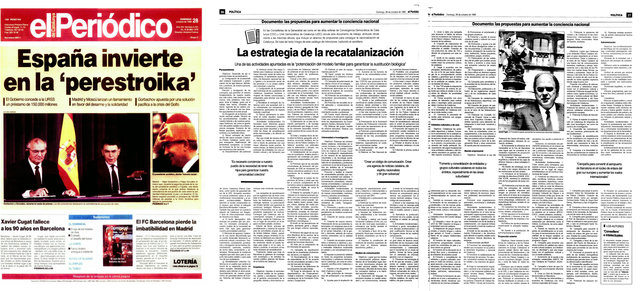 1980 the Spanish journal "El Periodico" published a secret document about the strategy of the Catalan government. It shows in a frightening way the actual spiritual world of the separatist leaders.
1980 the Spanish journal "El Periodico" published a secret document about the strategy of the Catalan government. It shows in a frightening way the actual spiritual world of the separatist leaders.Now it is available in english translation.
Pancatalanism
the separatist's imperial claim
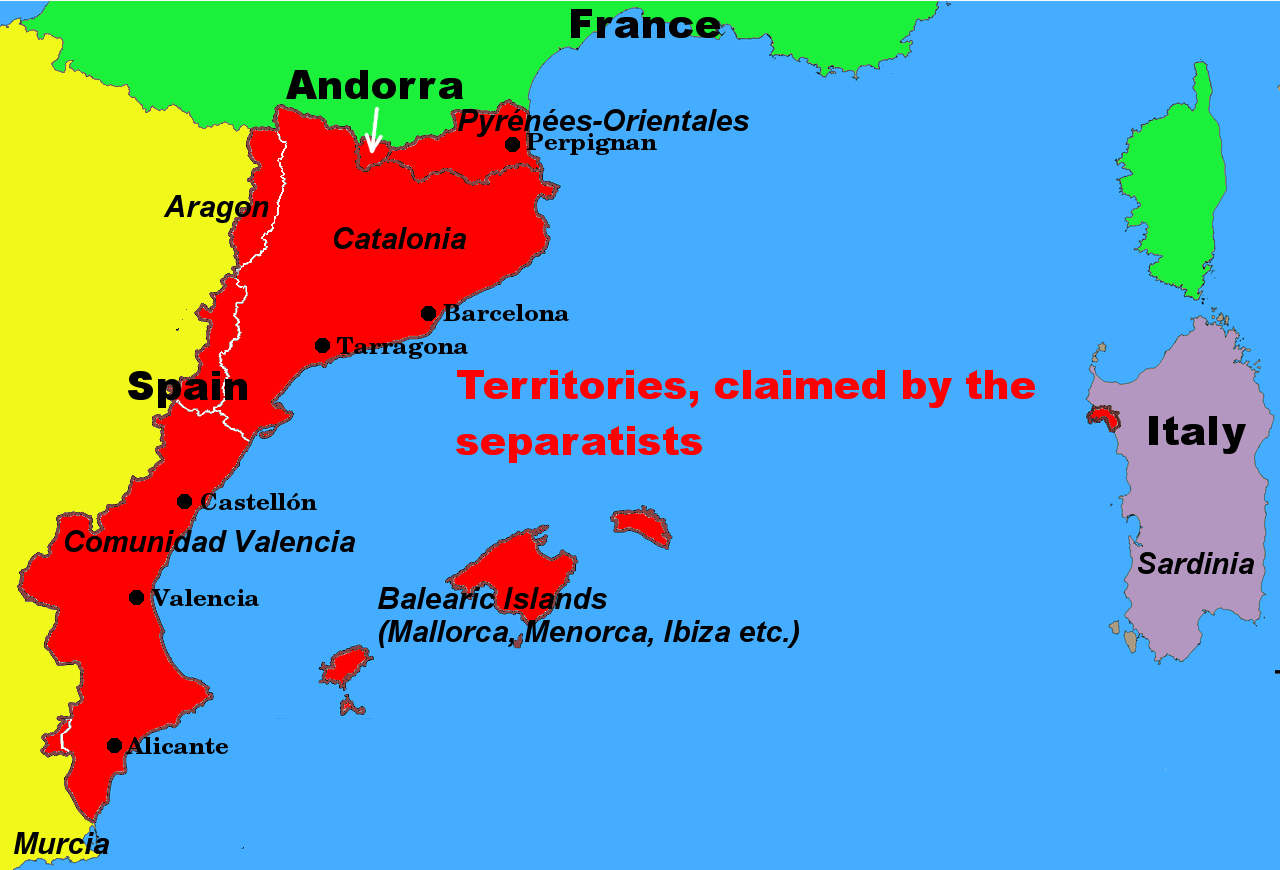 The Catalan government exports the conflict into communities with Catalan population, supporting all efforts of the separatists including financial means to destroy Spain.
The Catalan government exports the conflict into communities with Catalan population, supporting all efforts of the separatists including financial means to destroy Spain. An important tool is the establishment of a language dictatorship that is not afraid to use the same means as Franco.
Separatist indoctrination

Click here to read the study
Publications
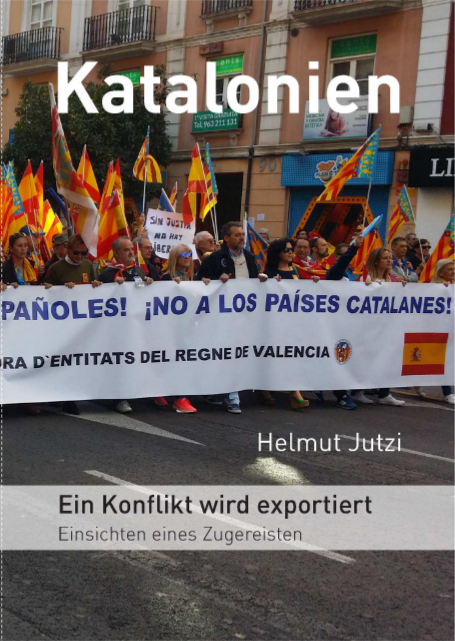 The title says: "Catalonia, a conflict is exported. Insights of a migrant"
The title says: "Catalonia, a conflict is exported. Insights of a migrant"Sorry, up to now, this book is only available in German. However, drop us a line, if you are interested to learn more Contact.

